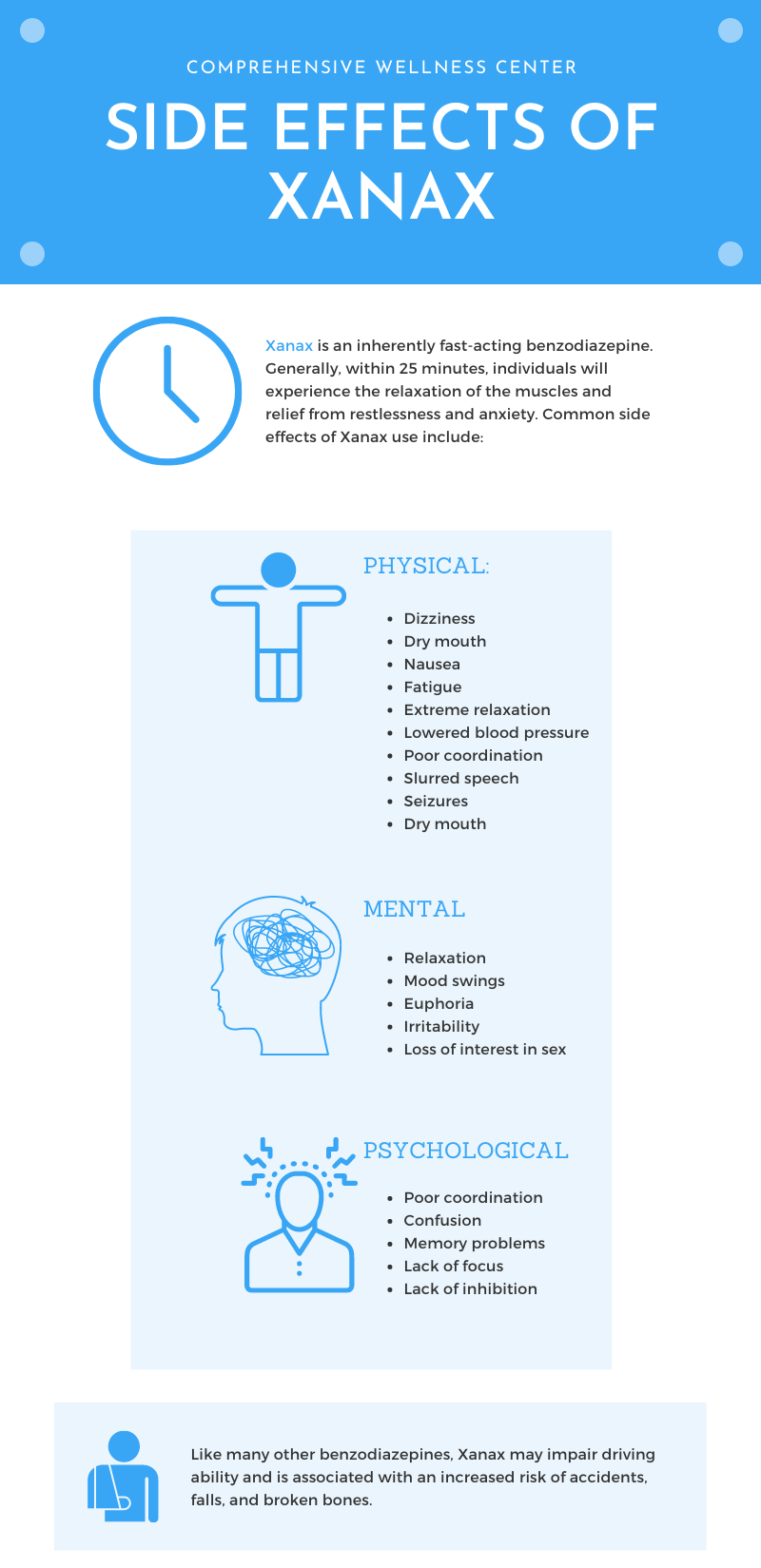Xanax is the brand name for a drug called alprazolam. Part of the benzodiazepine family, Xanax is a drug that affects the central nervous system, slows brain activity, and ultimately causes relaxation. This medication is generally prescribed for panic disorders, PTSD, anxiety, panic disorders, and other phobias.
While Xanax has been proven to be an effective drug for treating panic disorders and anxiety, many people often abuse and misuse this drug. Some individuals seek relief from everyday stress and social anxiety. Others may desire the loose and carefree feeling that generally follows taking Xanax. This specific class of benzodiazepines is depressants. In elevated doses, Xanax can produce an effect similar to indulging in copious amounts of alcohol.
The side effects of Xanax generally lowers inhibitions and alters an individual’s ability to make responsible decisions. Identical to alcohol, Xanax abuse, and even withdrawal is dangerous and potentially fatal.
Is Xanax Addictive?
Xanax is one of the most addictive medications within the benzodiazepine family. Individuals who abuse Xanax can experience unpleasant and potentially fatal symptoms when they quit taking the substance. Withdrawal from extended Xanax abuse can be deadly. Individuals who abuse Xanax should taper off the prescription by taking lower doses over an extended period of time, under the supervision of a physician or addiction professional.
Not every individual who takes benzodiazepines gets addicted. However, many people who take the drug at a high enough dose over an extended period of time will experience a rebound effect. A rebound effect is a more vibrant version of the symptoms the drug was initially prescribed to treat like anxiety and sleeplessness.
There are many factors that contribute to the likelihood of an individual developing an addiction to Xanax such as environment, mental health history, family history of addiction, trauma, and situational stressors. Individuals who find themselves addicted to Xanax tend to use the medication to cope in more emotional ways and generally take more than the recommended dose of the prescription.
What are the side effects of Xanax?

Like many other benzodiazepines, Xanax may impair driving ability and is associated with an increased risk of accidents, falls, and broken bones.
What are the signs of Xanax addiction?
Tolerance to Xanax tends to develop rather quickly, which requires the user to take more of the prescription to achieve the same desired effects. There are many common signs of Xanax addiction. Regardless of the substance abuse here is a list of general warning signs you or a loved one may be struggling with addiction.
- Slurred speech
- Confusion
- Disorientation
- Lack of coordination
- Reckless behavior
- Drowsiness/Sedation
- Irregular sleeping patterns
- Feeling lightheaded
- Memory problems
- Sluggishness
- Nausea
- Blurred vision
- Tremors
- Depression
- Delirium
- Seizures during withdrawal
- Legal consequences
- Missing school/work
- Isolation
- Loss of interest
- Aggression
- Impulsivity
How to find a treatment center for Xanax addiction
Asking for help is the most important first step you can take in seeking treatment for Xanax addiction. It may be helpful to reach out to a supportive friend or family member. Make a doctor’s appointment so you can be properly assessed and come up with an appropriate treatment plan.
Treatment for Xanax addiction generally involves addressing the addiction on two main fronts: the physical compulsion for the individual abusing the Xanax and the mental craving for more of the drug.
What to expect from Xanax detox
Symptoms of Xanax withdrawal are generally more severe than that of other benzodiazepines. Detoxification is a process that aims to help an individual safely quit taking Xanax while mitigating withdrawal symptoms. Detox is usually done in a hospital or rehabilitation facility under medical supervision to ensure safety and comfortability. Xanax withdrawal symptoms may include:
- Body aches/pain
- Aggression
- Anxiety
- Dizziness
- Hypersensitivity
- Insomnia
- Restless Leg Syndrome
- Irritability
- Vomiting
- Tremors
- Tense muscles
- Nightmares
- Depression
- Paranoia
- Difficulty breathing
- Seizures
What to expect from treatment for Xanax addiction
The goal of Xanax addiction treatment is avoiding the use of taking the drug and addressing any underlying conditions such as anxiety or depression. There are a variety of treatment options available for Xanax addiction.
Therapy is a vital component in treating substance use disorder of any kind. More often than not, individuals struggling with addiction have underlying mental health disorders or have experienced traumatic events throughout their lifetime. Therapy is a quintessential tool utilized in treating Xanax addiction.
Cognitive-behavioral therapy (CBT) is the most common form of therapy when treating benzodiazepine addiction. CBT aims to address the thought patterns, emotions, and behaviors underlying substance abuse disorders. This specific form of therapy involves the individual working with a therapist to establish a set of healthy coping skills.
Research has shown that when used alongside tapering CBT is effective in reducing benzodiazepine use over a three-month period.
Other common therapies may include:
- Group therapy
- Individual psychotherapy
- Marital or family counseling
- Education
- Support groups
- Holistic therapies
Xanax addiction is not curable, however, it is a treatable condition. Recovery is a lifelong process that takes time and commitment to maintain long term sobriety. Patience, love, and tolerance are vital to recovery.
At Comprehensive Wellness Centers, we believe that each individual patient that walks through our doors requires and deserves their own personalized path to rehabilitation and healing. At our drug rehab program in West Palm Beach, our compassionate treatment staff employs services that go above and beyond traditional treatment models. This includes our Partial Hospitalization Program (PHP).
Our South Florida PHP program has been specifically designed to allow for the creation of effective, individualized plans to help you or your loved one successfully transition to the next level of health and healing. In our dual diagnosis treatment center, all patients receive individual and group therapy, counseling, medication management, and aftercare support from our compassionate and attentive professionals.













